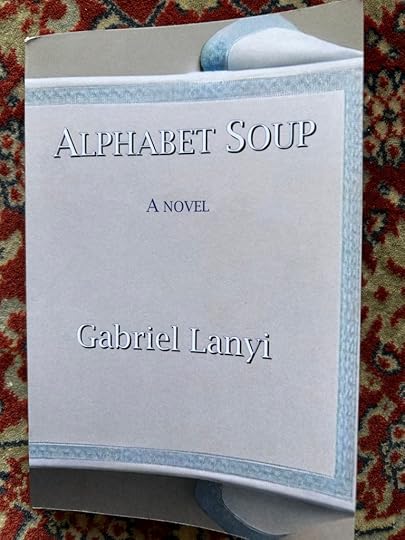Alphabet Soup by Gabriel Lanyi

As soon as I finished readiing this book I felt a strong urge to go back and read it from the beginning again – something of a rare experience for me. The author of this book has prepared so many traps and set so many false trails for the unsuspecting reader that there is no way he or she can fathom what is in store or where the book is taking them. Or perhaps anyone like myself who is accustomed to the conventions of the literary idiom and also belongs to a different era finds that they are all at sea in the wealth of esoteric knowledge displayed here, alongside sometimes tedious accounts of travel to distant places, whether exotic or banal. After all, how can one equate a heart-stopping journey by rickshaw through Cochin with a detailed account of the metro stations of Moscow?
Be that as it may, the author definitely knows a lot of things about a lot of things. He has chosen to introduce his book to the reader by means of a prologue written in a confiding tone in which the narrator sets out to explain what the book contains but then goes off on a tangent describing a real or imaginary typographic machine with a detailed account of the printing or typographic process that has dominated human written communication for the last five hundred years.
In a device that harks back to a seventeenth-century literary convention, each chapter begins with a summary provided by the putative narrator, giving an indication of what is contained within it. Thus, the reader is provided with a context that enables them to grasp the direction in which the book may or may not be going. More or less from the get-go the reader knows that the book is set in 1992, “some two-and-a-half years after the fall of the communist regime in Romania.” That, in fact, is the concept that dominates the whole book, providing the reader with the viewpoint of one of the main protagonists, fifty-year-old Aurelia, who leaves her native Romania to visit her elderly aunt in Boston, USA. Aunt Valeria is a piano teacher and much of the book is devoted to arcane discussions that supposedly take place between the various characters regarding the two separate recordings of Bach’s Goldberg Variations by Glenn Gould, the last concert given by Dino Lapatti in Besancon and various aspects of harmonic theory that are as remote from the average reader as astronomy is from astrology.
This is no clash of civilisations, but it certainly represents some kind of culture clash for an individual coming from a society that has been dominated for generations by the shadow of the police state. And so Aurelia, although an independent and spirited woman, finds herself adrift in Boston, albeit under the tutelage of her aunt Valeria and her cousin Lawrence. A friend of the family, Leonard, also plays a part and is even persuaded to take Aurelia on a trip to New England before she returns to Romania. The author’s choice of similar-sounding names tends to lead to confusion in the reader’s mind, and this may indeed be intentional. We are also informed that Leonard (or is it Lawrence?) is writing a book, which is somehow embedded in the narrative we are reading, though it is not always clear where one begins and the other ends. In addition, lengthy epistles from a distant admirer of Aurelia’s describe his travels in distant lands, and these letters are clearly distinguished from the rest of the book by the use of a different font, helping the reader to find their way through the labyrinth of information contained in the book. In a final throwaway line we learn that here, too, the Holocaust has played a part, albeit in a minor and almost imperceptible way.
As the book ends the reader finds that even intellectuals who seem to live in elite spheres of cerebral ecstasy are prone to mundane human emotions, albeit not to an inordinate extent. And so Aurelia chooses to resume her mundane but familiar life in Romania and rejects the comfort and unfamiliarity of life in America, leaving three men disappointed in love but apparently accepting their fate with equanimity.



